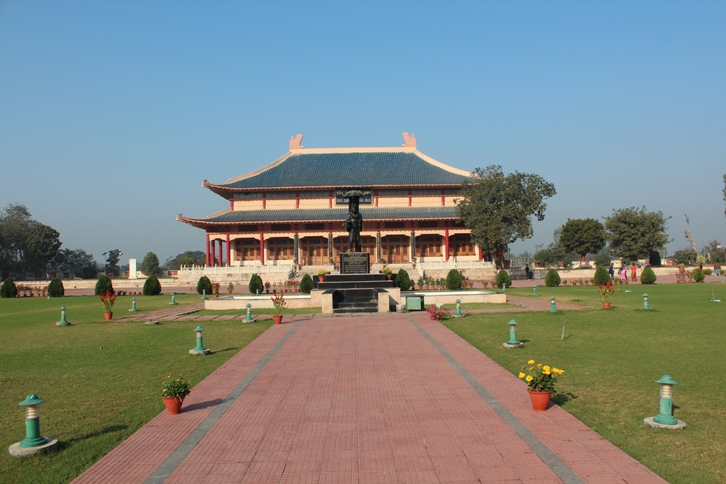
Hiuen Tsang Memorial Nalanda
In the run up to the 30 nation meeting in Beijing on 'One Belt, One Road' (OBOR) and thereafter were a series of articles on how India erred by not sending its representative to attend President Xi Jingping's initiative.
Events and reports of the last few weeks make it appear that China used Chanakya's sutra of "Saam, Daam, Dand and Bhed" to get India to attend BRF. It was to convince India that she lost an opportunity to connect with Central Asia and Europe. We should also note that China will single-mindedly purse its objectives irrespective of what other countries think.
Here is how India must deal with OBOR in particular and China-Pakistan in general.
If Indians get awed by Chinese achievements in infrastructure and manufacturing, we have the lost the mind game. We need a balanced approach, admire and learn from the Chinese, whilst focusing on nation building and leveraging our strengthens.
India must not overreact to Chinese moves on OBOR. She must remain centred, anticipate Chinese moves and have a Plan B.
She must be steadfast in her stand that Gilgit and Baltistan are part of India.
India need not copy China's growth model but must develop her own.
Indians should not compare themselves with China on development and international status. She must chart her own path.
India's mantra for China should be: cooperate and compete. Be driven by national interests and devoid of emotion.
The lure of her vast market and the intellect of her people will attract Chinese and U.S. companies to invest and make profits.
Sustain and re-energise Indo Russian relations. Due to Western sanctions Russia supports China today. Who knows what the future has in store?
A railway line from Tibet to Nepal would be financially viable when its products serve the Indian market or Indian tourists use it to reach Tibet. We should be aware not insecure.
Nepal and Bangladesh are welcome to do business with the Chinese. Whilst saying that give them a booklet of "how Chinese investments in Africa, Sri Lanka and Myanmar have faced strong local backlash and national election campaigns in Zambia and Sri Lanka were held on an anti-China plank."
India must work on building economic and military power. The Make in India initiative is important esp. for the latter.
Promote tourism to North-eastern states in a big way.
Make Manipur the gateway to Myanmar and beyond. Start direct flights between Imphal and Yangon.
Indian companies should be encouraged to export to and invest in Myanmar.
India "should simultaneously step up its infrastructure building in India and the neighbourhood. It should look to pool its resources with the Japanese Partnership for Quality Infrastructure (PQI)."
Media, think-tanks and government should study the financial viability of projects along OBR and monitor actual implementation. Findings must be published so that the Indian public do not fall prey to misinformation.
India must work on countries that are on OBOR and expect sizable investments. Intent is to forewarn as a friend, not dissuade.
Relations with Pakistan must be seen through the prism of China and not in isolation. If India had woken up to this reality in the 1980's the situation might have been different today.
Study impact of the recently announced China and Pakistan plan to develop 40,000 MW of hydro power in the region called the Indus River Cascade, which begins from Skardu in Gilgit-Baltistan and runs through Khyber-Pakhtunwala.
Divide Pakistan into Sunni and Shias, Punjabis vs. the rest. Make them fight against other.
Provide "political, diplomatic and moral support to the Baloch people who may be engaged in disrupting the corridor."
By nature Indians talk too much and at times threaten neighbours. Chose your words carefully and let neighbours not be referred to in election campaigns.
Lastly, It would be apt if those who want India to be part of OBOR shared details of potential gains for the Indian economy. Note that India is not an export driven economy like China, so the need for sustaining growth rates through exports is lesser.
India does not need an enemy to keep it united. Instead, we should be proud of belonging to a civilization that has exported its culture without the power of the sword.
The author is an independent columnist. He tweets at @sanjeev1927